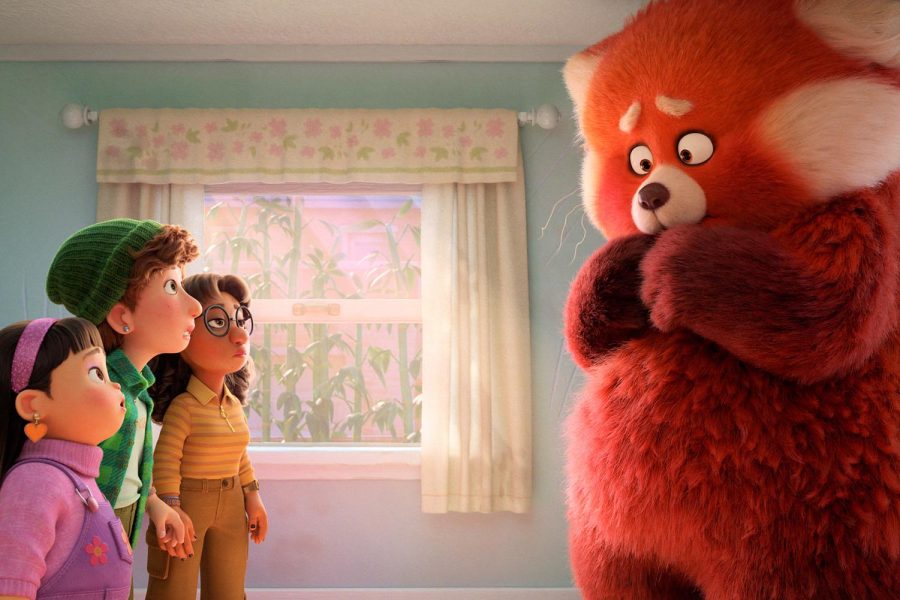Turning Red puts a twist on the classic coming-of-age story
Walt Disney Pictures/Pixar Animation Studios
The new Disney/Pixar film follows Meilin “Mei” Lee (voiced by Rosalie Chiang) as she dances, listens to boy band 4*Town, and, on occasion, turns into a giant red panda. Disney still has a long way to go in terms of good representation, but Turning Red is perhaps a step in the right direction.
April 11, 2022
Like many movies, Turning Red is a coming-of-age story. However, unlike most, Turning Red focuses on a Chinese Canadian girl going through puberty. The new Disney/Pixar film follows Meilin “Mei” Lee (voiced by Rosalie Chiang) as she dances, listens to boy band 4*Town, and, on occasion, turns into a giant red panda. Mei gets this power as her family honors an ancestor who wielded the power of the red panda. At first her mother Ming (Sandra Oh) thinks that Mei is having her first period, a too-often taboo subject in film as a whole.
Every time Mei has an extreme emotion she turns into the giant red panda, and when she is calm again she reverts into her human self. Asian women are so rarely allowed or expected to be loud, to express emotions outwardly, especially anger, and to take up space. That is exactly what Turning Red does well, by turning that stereotype on its head and putting a loud Asian girl at the forefront of the narrative.
Mei is backed by her loyal friends Miriam (Ava Morse), Priya (Maitreyi Ramakrishnan), and Abby (Hyein Park). These characters are another strong point of Turning Red, providing humor and motivation with an array of diverse characters. Each character has a unique personality that is evident on screen. Together the four friends have a tight bond, with the others supporting Mei when she is going through unexpected changes. Too often it can be easy or popular to hate on teenage and middle school girls. This film subverts that, instead showing their loyalty and close bonds. It captures the intensity of their experience, without mocking it and still making it lighthearted and fun for an audience to watch.
Turning Red isn’t perfect, the characters choose to profit off of the “foreignness” of the red panda transformation in order to get tickets to boy band 4*Town, which draws interesting parallels to groups like BTS. In addition, Ming plays the role of a tiger mom for most of the film. A tiger mom is a strict Asian mother, and often first generation immigrant, who pushes her kids to academic success at all costs. This is further expanded upon by all the other women in Mei’s life, her grandmother and aunties who play the part of antagonists for the majority of the film. They act as overbearing yet cold Asian women. And while the film may be using this to point out the stereotype, to critique it, it might have been good to see some more of the complexities of their characters.
One small standout scene is when Jin (Orion Lee), Mei’s father, is cooking dinner for the family. It is clear that extra effort went into this moment as it is less than 30 seconds long, but remains one of the most memorable scenes in the whole movie. In a lot of Western media Asian food is depicted as gross, repulsive, exotic, or smelly. Turning Red makes bao, congee, and other foods, many of Taishanese origin, look mouthwateringly good. The highly saturated vegetables look crisp and fresh, soy sauce thick and rich as it is poured, and the final product is almost good enough to eat right off the screen.
Disney still has a long way to go in terms of good representation, but Turning Red is perhaps a step in the right direction.






